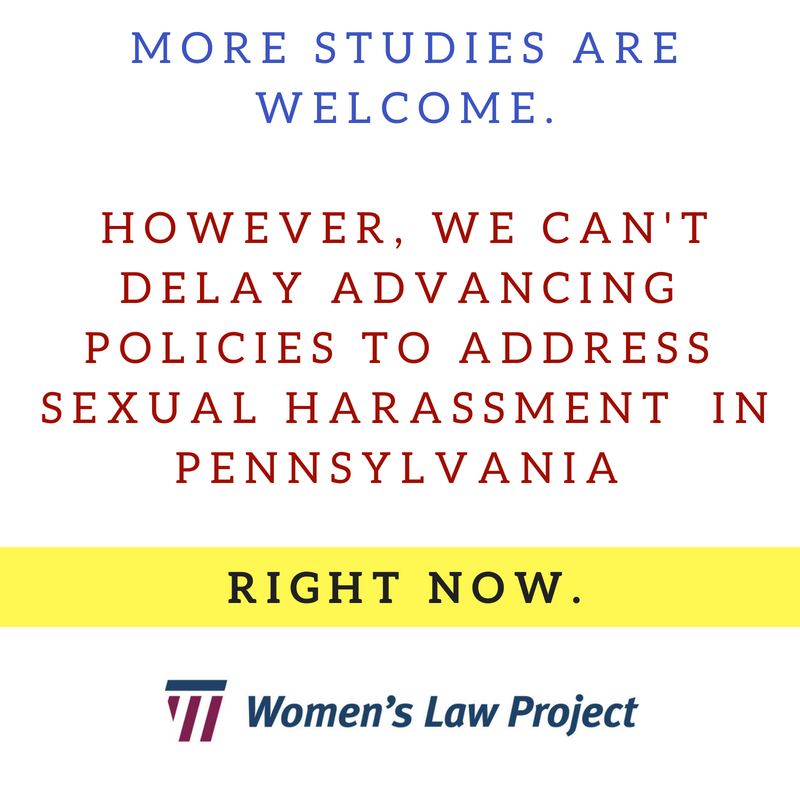
The Pennsylvania House of Representatives adopted two new resolutions to study and monitor sexual harassment in the workplace in Pennsylvania.
- The first resolution will establish a Task Force on Harassment and Sexual Misconduct in the Workplace. The taskforce will be responsible for conducting a comprehensive review to unearth any inadequacies in current laws, regulations and policies surrounding this subject and producing a report to the General Assembly with its findings and recommendations.
- The second resolution will direct the Joint State Government Commission (JSGC) to study the frequency of harassment and sexual misconduct in the workplace in state government.
The effort to monitor the prevalence of sexual harassment in Pennsylvania workplaces is welcome, and we look forward to reviewing the results. However, these studies should not be used to delay taking immediate action on the very serious problem of sexual harassment in Pennsylvania.
We already know sexual harassment is a pervasive problem across the Commonwealth, and legislation has already been drafted and introduced that can be advanced today in order to better protect workers.
In April, Managing Attorney Terry L. Fromson shared our policy recommendations at the Pennsylvania House Committee on Labor and Industry public hearing on harassment and sexual misconduct in the workplace.
Some of the policy proposals are simple and already overdue. For example, we have known for years that the Pennsylvania Human Relations Act (PHRA) only applies to employers with 4 or more employees. The local agency thresholds vary from 1 to 4 to more. This means some people have no statutory remedy for harassment because of geography and/or size of their employer.
Why should an employer be allowed to harass an employee if it only has 3 employees? As the state law that covers all Pennsylvanians, the PHRA’s employee threshold should be reduced to one.
Other #MeToo policy reforms that could and should be enacted today:
- Expanding the PHRA to cover more than just employees, individuals who under the law are considered to be under the control of the employer. Independent contractors, unpaid interns and volunteers are equally if not more vulnerable to sexual harassment and should be covered.
- Eliminate exclusions long written into the law for agricultural and domestic workers. They are rooted in explicit racial discrimination and there is no logical basis for leaving these workers unprotected.
- Extend the time for filing complaints to afford individuals more time to consider their options.
In her testimony, Fromson emphasized that legislative reform in this area should not be limited solely to sexual harassment. Harassment based on race, ethnicity, and other protected categories are equally harmful and malicious. We must also ensure that reform efforts are victim-centered, meaning the complainants choose how to proceed and options are not chosen for them so as not to deprive a complainant of either autonomy or a remedy.
Read our recommendations for a #MeToo policy agenda in Pennsylvania here.
Regarding the second provision, we also welcome new data and information about the prevalence of sexual harassment in state government. However, we don’t need formal task force report to know that it is a serious problem, when a New York Times report detailing deeply disturbing allegations of sexual harassment and assault by a Pennsylvania state representative is just one of several additional reports on sexual harassment in the Capitol.
We thank Rep. Sheryl Delozier (R-Cumberland) for leading an effort to improve data on sexual harassment in Pennsylvania, and call for immediate action.
The Women’s Law Project is a public interest law center in Pennsylvania devoted to advancing the rights of women and girls.
Sign up for WLP’s Action Alerts here. Follow us on twitter and like us on Facebook.
We are a non-profit organization. Please consider supporting equal rights for women and girls by making a one-time donation or scheduling a monthly contribution.


